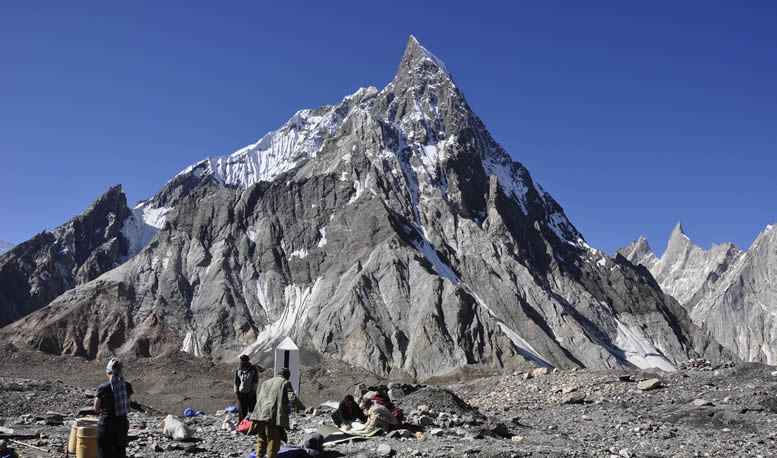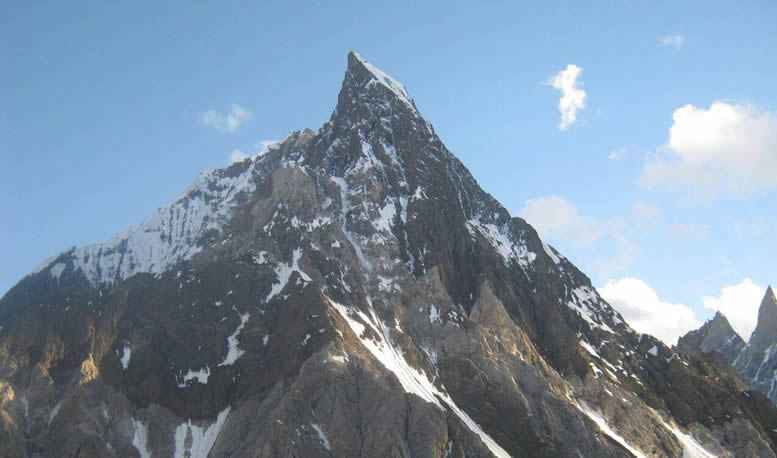Mitre Peak, also known as "Miter Peak," is a mountain located in the Karakoram range of the Himalayas, situated in Pakistan-administered Kashmir. It stands at an elevation of approximately 6,010 meters (19,718 feet) and is known for its striking pyramidal shape and technical climbing challenges.
Mitre Peak is named after its resemblance to a bishop's mitre, a type of ceremonial headdress. The mountain features steep granite faces, sharp ridges, and a prominent summit pyramid, making it a visually impressive peak in the region.
The ascent of Mitre Peak requires advanced mountaineering skills and experience in technical climbing. The mountain offers a range of challenging routes, including steep rock faces and mixed ice and snow terrain. Climbers must be proficient in various climbing techniques, including rock climbing, ice climbing, and route finding.
The climbing season for Mitre Peak is typically during the summer months when weather conditions are more favorable. However, the Karakoram range is known for its unpredictable and harsh mountain weather, and climbers must be prepared for rapidly changing conditions, including snowfall, high winds, and low temperatures.
Reaching the summit of Mitre Peak rewards climbers with panoramic views of the surrounding Karakoram Mountains, including neighboring peaks, glaciers, and deep valleys. The rugged and remote beauty of the region adds to the allure and sense of adventure associated with climbing Mitre Peak.
Given the technical nature of the climb and the potential hazards of high-altitude mountaineering, climbers attempting Mitre Peak should have prior experience, proper training, and appropriate equipment. It is important to engage the services of experienced guides or mountaineering agencies familiar with the area to ensure safety and increase the chances of a successful ascent.
Mitre Peak offers a challenging and rewarding climbing experience for those seeking a technical and visually striking ascent in the Karakoram. The combination of its distinctive shape, technical difficulties, and breathtaking surroundings make it an enticing objective for experienced mountaineers.
| Lodging at base camp (single supplement) |
| Full base camp with dinning tent, bathroom, showers & solar charge |
| All internal/domestic transport |
| All domestic flights |
| 50kgs (110 lbs) personal baggage |
| All meals during trek and at base camp (B,L,D) |
| Group emergency equipment/satellite phone service with fixed calling charge |
| Two nights stay in Islamabad hotel on arrival and two on return (bed & breakfast only) |
| Staff insurance (guide, cook, kitchen staff, assistant(s) & porters etc) |
| Experienced cook from Pakistan |
| Kitchen staff |
| Porters for all expedition supplies |
| Solar power at base camp |
| Electricity generator (backup for high voltage devices) |
| International airfare |
| Permit/royalty fee according to number of persons |
| Personal climbing equipment, clothing & sleeping equipment |
| Group climbing gear (rope, ice crew, snow bar, EPI gas, cooking pots and others) |
| Mountain climbing rescue and evacuation insurance policy - mandatory |
| Lodging and meals above base camp |
| Any service above base camp |
| Communication radio (walkie talkie) |
| Weather reports |
| Personal equipment cargo to/from Islamabad |
| Pakistan visa fee |
| Tips/gratuities to staff, cook, assistant(s) of US$ 250 per person in total |
| Meals in Islamabad |
| Extra hotel nights after the climb |
| Trip cancellation insurance |
| All expenses incurred in the event of early wind-up/summit (extra hotel nights, meals at hotels, evacuation) |
| Charges incurred due to delays beyond the control of Apricot Tours (Force majeure) |
| Personal communication (phone, fax, e-mail) between Pakistan and home country. |
Google Maps
Gallery


